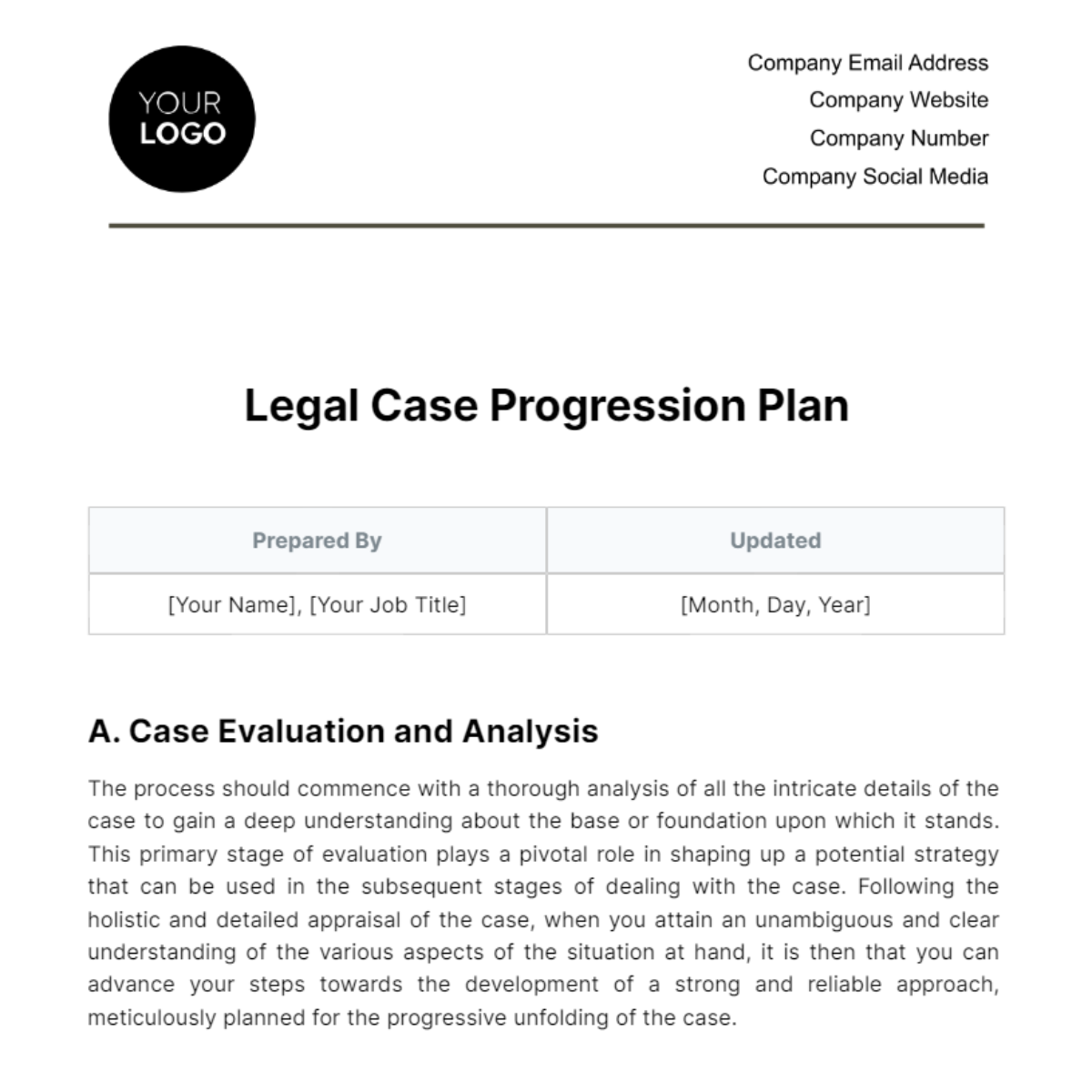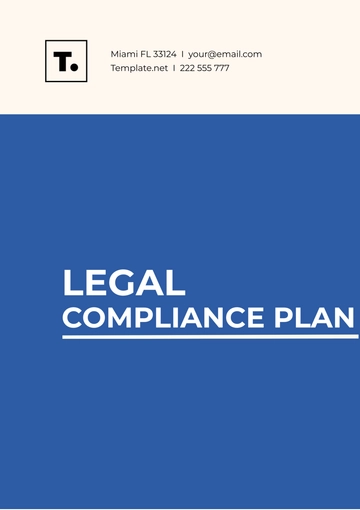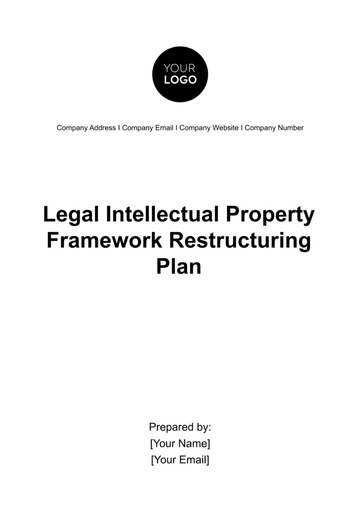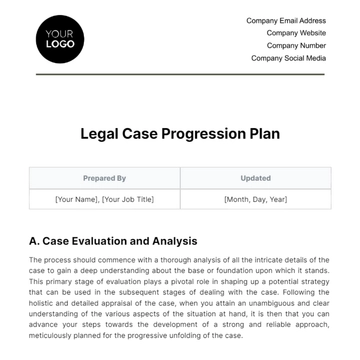Free Legal Case Progression Plan

Prepared By | Updated |
|---|---|
[Your Name], [Your Job Title] | [Month, Day, Year] |
A. Case Evaluation and Analysis
The process should commence with a thorough analysis of all the intricate details of the case to gain a deep understanding about the base or foundation upon which it stands. This primary stage of evaluation plays a pivotal role in shaping up a potential strategy that can be used in the subsequent stages of dealing with the case. Following the holistic and detailed appraisal of the case, when you attain an unambiguous and clear understanding of the various aspects of the situation at hand, it is then that you can advance your steps towards the development of a strong and reliable approach, meticulously planned for the progressive unfolding of the case.
B. Identification of Legal Issues
The vital first step consists of identifying the primary legal issues present within the case. These issues may take several forms and could range widely in nature - from instances of contract breaches to possible violations of civil rights. Recognizing these concerns does not only cater to focusing the case analysis but also sets the groundwork for comprehensive research and an insightful discovery which are integral in deriving a solution to the case.
C. Research
It is pivotal to conduct a thorough and detailed research on all pertinent legal issues associated with the case, which includes an in-depth evaluation of case laws and statutory laws that could relate to or influence the outcome. In order to foster this research, it is important to harness resources such as legal databases, which compile a multitude of legal perspectives and can facilitate a profound understanding of different dimensions of the law. Past rulings on cases that bear similarity to the one in question are also essential when conducting research, as these guidelines can aid in predicting the likely course, and perhaps outcome, of the current case.
Moreover, academic journals, which aggregate sessional papers written by experts in the field, facilitate access to a wealth of scholarly views on various legal issues, thereby serving as indispensable resources for comprehensive legal research.
D. Information Gathering and Discovery
Begin the process of discovery in order to collect critical evidence that will strengthen your case. This process could involve a variety of methods depending on the nature of the case. Interviewing witnesses can provide firsthand accounts and crucial details that will support your argument. Gathering documents can also be an effective way to substantiate your case with tangible evidence, as these could include anything from emails and contracts to official reports and invoices. If these steps do not yield enough evidentiary support, depositions might be a useful course of action. These formal, sworn statements can often compel individuals to share more complete accounts of events, thereby providing a more comprehensive evidence base.
E. Case Strategy Development
After conducting a comprehensive analysis of the case, thoroughly examining all associated legal issues, undertaking comprehensive research, and completing the discovery stage accurately, you are required to construct a strategic plan for handling the case moving forward. This plan should be comprehensive, covering key elements such as the primary arguments that we intend to make, the manner in which we will present and structure our evidence, any counter-arguments we anticipate from the opposing side and how we plan to respond to those, and finally, a detailed plan on our approach to examining witnesses during the court proceedings.
F. Preparation of Legal Documents
In order to proceed with the legal process, it is vital to prepare all the necessary legal documents that might potentially be required. These documents can encompass a variety of forms, such as complaints, motions, and a host of other types of court filings. Once these documents have been prepared, it's imperative to not only review them thoroughly but also to file them appropriately. Every step in this process, from preparation to the final filing, must be carried out in strict adherence to the particular rules and deadline regulations set by the court. It's crucial to meet these standards to avoid any potential disruption or delay in the court proceedings.
G. Communication and Engagement
It is essential to engage in a positive manner with all appropriate stakeholders, such as the client, court personnel, the attorneys involved, and any experts that may be necessary for the case. Ensuring regular and clear communication as the case progresses is of utmost importance and cannot be overstated. It is crucial not only for the smooth handling of the case but also for maintaining robust relationships between all parties involved.
H. Pretrial Activities
It is strongly advised that individuals or organizations should engage in pretrial activities. These pretrial activities could include a wide array of actions, one of which might be engaging in settlement discussions. In certain circumstances, it may even be necessary to embark on rehearing or re-briefing processes. All of these efforts are seen as active undertakings that have a clear purpose which is to lay a substantial, unshakeable foundation for the imminent trial. By participating in such activities, it makes possible the facilitation of preparations to better tackle any scenario that may manifest during the course of the trial. Hence, indulging in these pretrial activities could potentially be a pivotal factor in determining the outcome of the trial.
I. Trial Preparation
In order to successfully prepare for a trial, it is crucial that one creates a binder that includes all necessary documents pertinent to the case. The essential documents to be included in the trial binder are pleadings, memorandums of law, and copies of statutes and case laws relevant to the matter at hand. Furthermore, it is equally important to take the time to organize all evidence in a systematic way to ensure easy access when required during the proceedings.
The proper preparation of witnesses must also be carried out; this includes informing them of the trial process, familiarizing them with potential questions, and strategically reviewing their testimonies. It is essential to rehearse both opening and closing statements to put forth a compelling narrative of the case. Additionally, it is equally important to be fully prepared to address any cross-examinations. As an attorney, one should always remain alert for unexpected questions or challenges. This rigorous preparation will ensure readiness for every facet of the trial.
J. Post-trial Activities
The process of engagement does not conclude merely once the trial period has concluded. There may be various activities that need to occur post-trial, which can include potentially needing to respond to the verdict. Further tasks could be filing an appeal if it becomes necessary to do so. The collection of judgments could also be a requirement in the aftermath of the trial. Lastly, there could be a need for continued or follow-up communication with the client to discuss further steps or keep them updated on proceedings.
K. Case Review and Improvement
After the completion and conclusion of the case, it becomes a necessary step to perform a comprehensive review of the case. The main focus of this case review would be an analysis of the performance exhibited during the case handling, understanding of the key learning outcomes that were derived from the case, and the identification of areas that were lacking and need further improvement. By performing this case review analysis, we are potentially setting up a robust system that can greatly contribute to enhancing the handling of future cases. Moreover, this review can provide us with vital insights to plan and formulate better and more effective legal strategies in the future.
L. Contingency Plan
In case there are unforeseen circumstances or if there are significant changes that take place in relation to the case, the legal team has a responsibility to come together to reevaluate the strategy that has been in play thus far. It is then their duty to make any necessary adjustments in order to ensure that the strategy in place is the best suited to tackle the changes. Furthermore, the team of legal professionals is responsible for swiftly communicating any developments to the senior management team. Any progression or development in the case that can potentially influence or impact the final outcome in any way is important and the senior management team needs to be kept aware of such occurrences.
Conclusion:
The Legal Case Progression Plan under discussion here provides an in-depth overview that encompasses all the essential details and strategies which are tailored for different kinds of legal cases. Our main intention behind steadfastly adhering to this plan is to streamline the process that the legal team undergoes during litigation. We also aim to manage the entire process in the most effective way possible. Through this level of strategic organization and management, we aim to greatly enhance our chances of turning the tide in our favor and achieving a favorable outcome from the legal proceedings.
- 100% Customizable, free editor
- Access 1 Million+ Templates, photo’s & graphics
- Download or share as a template
- Click and replace photos, graphics, text, backgrounds
- Resize, crop, AI write & more
- Access advanced editor
Introducing Template.net's Legal Case Progression Plan Template: your essential tool for managing legal matters efficiently. Customize and edit seamlessly with our Ai Editor Tool, ensuring every detail aligns with your specific needs. Tailored for legal professionals, this template streamlines case management, saving time and enhancing productivity. Elevate your legal strategy with Template.net today.
You may also like
- Finance Plan
- Construction Plan
- Sales Plan
- Development Plan
- Career Plan
- Budget Plan
- HR Plan
- Education Plan
- Transition Plan
- Work Plan
- Training Plan
- Communication Plan
- Operation Plan
- Health And Safety Plan
- Strategy Plan
- Professional Development Plan
- Advertising Plan
- Risk Management Plan
- Restaurant Plan
- School Plan
- Nursing Home Patient Care Plan
- Nursing Care Plan
- Plan Event
- Startup Plan
- Social Media Plan
- Staffing Plan
- Annual Plan
- Content Plan
- Payment Plan
- Implementation Plan
- Hotel Plan
- Workout Plan
- Accounting Plan
- Campaign Plan
- Essay Plan
- 30 60 90 Day Plan
- Research Plan
- Recruitment Plan
- 90 Day Plan
- Quarterly Plan
- Emergency Plan
- 5 Year Plan
- Gym Plan
- Personal Plan
- IT and Software Plan
- Treatment Plan
- Real Estate Plan
- Law Firm Plan
- Healthcare Plan
- Improvement Plan
- Media Plan
- 5 Year Business Plan
- Learning Plan
- Marketing Campaign Plan
- Travel Agency Plan
- Cleaning Services Plan
- Interior Design Plan
- Performance Plan
- PR Plan
- Birth Plan
- Life Plan
- SEO Plan
- Disaster Recovery Plan
- Continuity Plan
- Launch Plan
- Legal Plan
- Behavior Plan
- Performance Improvement Plan
- Salon Plan
- Security Plan
- Security Management Plan
- Employee Development Plan
- Quality Plan
- Service Improvement Plan
- Growth Plan
- Incident Response Plan
- Basketball Plan
- Emergency Action Plan
- Product Launch Plan
- Spa Plan
- Employee Training Plan
- Data Analysis Plan
- Employee Action Plan
- Territory Plan
- Audit Plan
- Classroom Plan
- Activity Plan
- Parenting Plan
- Care Plan
- Project Execution Plan
- Exercise Plan
- Internship Plan
- Software Development Plan
- Continuous Improvement Plan
- Leave Plan
- 90 Day Sales Plan
- Advertising Agency Plan
- Employee Transition Plan
- Smart Action Plan
- Workplace Safety Plan
- Behavior Change Plan
- Contingency Plan
- Continuity of Operations Plan
- Health Plan
- Quality Control Plan
- Self Plan
- Sports Development Plan
- Change Management Plan
- Ecommerce Plan
- Personal Financial Plan
- Process Improvement Plan
- 30-60-90 Day Sales Plan
- Crisis Management Plan
- Engagement Plan
- Execution Plan
- Pandemic Plan
- Quality Assurance Plan
- Service Continuity Plan
- Agile Project Plan
- Fundraising Plan
- Job Transition Plan
- Asset Maintenance Plan
- Maintenance Plan
- Software Test Plan
- Staff Training and Development Plan
- 3 Year Plan
- Brand Activation Plan
- Release Plan
- Resource Plan
- Risk Mitigation Plan
- Teacher Plan
- 30 60 90 Day Plan for New Manager
- Food Safety Plan
- Food Truck Plan
- Hiring Plan
- Quality Management Plan
- Wellness Plan
- Behavior Intervention Plan
- Bonus Plan
- Investment Plan
- Maternity Leave Plan
- Pandemic Response Plan
- Succession Planning
- Coaching Plan
- Configuration Management Plan
- Remote Work Plan
- Self Care Plan
- Teaching Plan
- 100-Day Plan
- HACCP Plan
- Student Plan
- Sustainability Plan
- 30 60 90 Day Plan for Interview
- Access Plan
- Site Specific Safety Plan


















